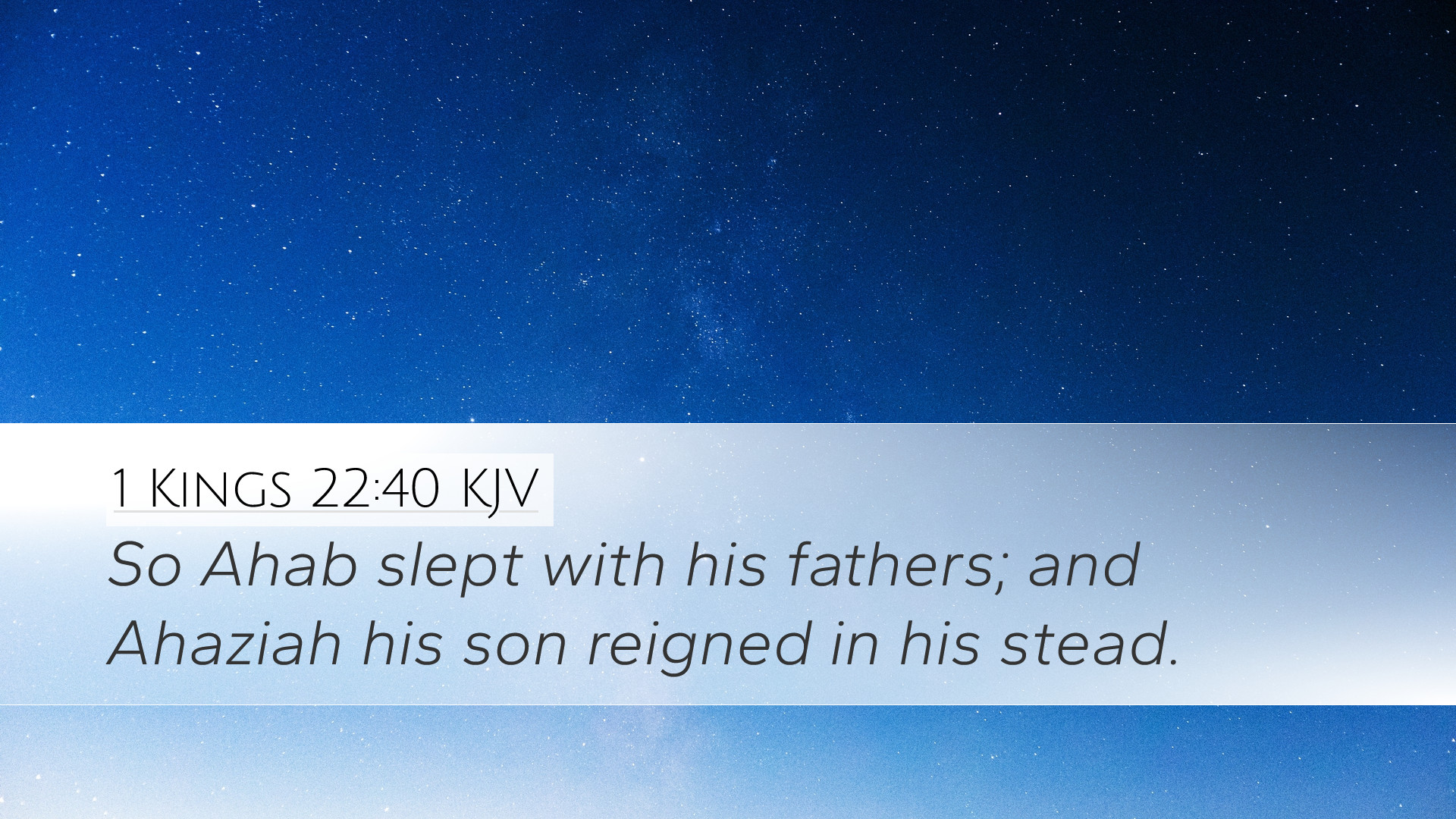Commentary on 1 Kings 22:40
Verse: "So Ahab slept with his fathers; and Ahaziah his son reigned in his stead in the second year of Jehoshaphat king of Judah."
Introduction
This passage marks a significant transition in the narrative of the kings of Israel. The death of Ahab and the subsequent ascension of Ahaziah, his son, serves as a pivotal moment that encapsulates themes of legacy, divine judgement, and the unfolding history of Israel. Here we will explore the implications of this transition, drawing insights from several public domain commentaries.
The Death of Ahab
Matthew Henry emphasizes that Ahab's death is not merely a historical fact but a theological statement about God's justice. As a king who persisted in idolatry and opposition to the prophetic voice, his demise signifies the fulfilment of God's judgment upon him for his many sins, particularly those involving the worship of Baal and the persecution of God's prophets.
Henry also points out that Ahab's death was designed at God's appointed time; it was not an accident but part of a divine plan that assures the sovereignty of God over earthly rulers. His death serves as a cautionary tale for future leaders regarding the dangers of rebellion against God's will.
Ahaziah's Ascension
Albert Barnes comments on Ahaziah's ascension, noting that he began to reign in the second year of Jehoshaphat, king of Judah. This mention not only provides a chronological marker but highlights the significance of the divided kingdoms of Israel and Judah. Ahaziah continues in the sinful ways of his father Ahab, failing to break the cycle of idolatry and immorality that characterized Ahab's reign.
Barnes also brings attention to the implications of Ahaziah's reign following Ahab. While Ahab's reign was marked by significant events, including his conflicts with the prophets of Yahweh, Ahaziah's rule is characterized by a lack of notable achievements or reforms. This serves as a reflection on the leadership and the overall spiritual state of Israel during this time.
Theological Reflections
Adam Clarke provides a rich theological interpretation of this passage. He highlights the concept of spiritual inheritance, where Ahaziah inherits not only his father's throne but also his sinful legacy. This raises important questions about the influence of parental behavior on future generations and the challenges they face in breaking free from past sins.
Clarke also examines the notion of divine providence at work in the succession of kings. The continuity of sinful leadership indicates a broader divine strategy at play, where God allows certain outcomes for humanity's ultimate purpose. The text serves as a reminder of the nature of God's patience and His call for repentance even amidst judgment.
Historical Context
This verse encapsulates a transitional moment in Israel's monarchy that is framed by historical realities. Ahab's reign was a culmination of political strife, military conflicts, and spiritual decline. In viewing Ahaziah's reign as a part of this historical tapestry, one can appreciate the depth of Israel's challenges during this period.
- Political Context: The ongoing power struggles between the northern and southern kingdoms serve as a background to Ahaziah's reign, complicating his rule.
- Religious Context: The persistent influence of idolatry initiated by Ahab invites theological reflections on covenantal faithfulness and apostasy.
- Prophetic Voice: The silent backdrop of prophetic ministry during Ahaziah's time suggests a looming spiritual crisis yet to be addressed.
Lessons for Today
This passage offers profound insights for contemporary leaders, theologians, and believers. Several themes emerge that remain relevant:
- Leadership Accountability: The narrative reminds all leaders of their responsibility before God, encouraging them to lead with integrity and righteousness.
- Influence of Legacy: The impact of Ahab's legacy on Ahaziah warns present-day leaders about the lasting implications of their choices on subsequent generations.
- Hope in Judgment: Even within the context of judgment, there remains hope for redemption and the possibility of future leaders who might turn the nation back to God.
- The Necessity of Prophetic Voices: The absence of divine guidance through prophetic ministry during this time raises questions about the necessity of listening to God's voice amidst leadership crises.
Conclusion
1 Kings 22:40 serves as a rich verse that encapsulates themes of legacy, sin, and divine judgment. Through the examination of this passage, we gain insights not only into the historical context of Ahab's reign and Ahaziah's succession but also into the spiritual truths that remain relevant across the ages. As we reflect on this text, let it inspire within us a renewed commitment to understanding the weight of leadership and the importance of our spiritual legacy.


